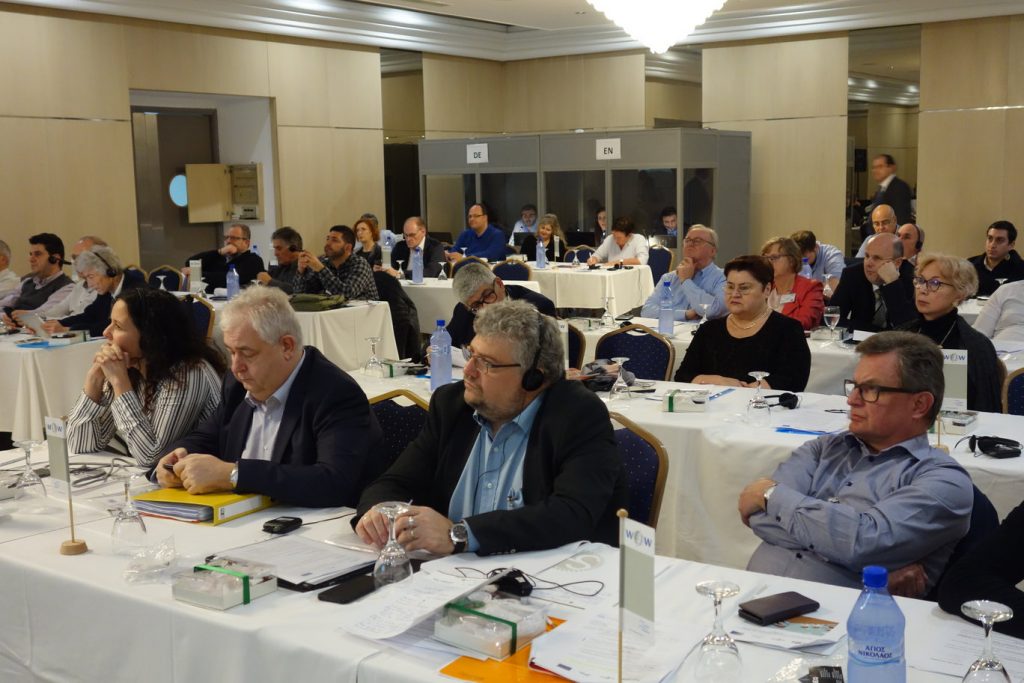Managing an organisation requires managers (leaders) who are up to their task. This is, however, not always the case and this may have negative impact on the organisation and the people working there. Strong leaders who use good management skills have a positive impact on a company in a number of ways, such as increasing turnover, improving the morale and empowering employees to be more productive. Management and managers need to lead (and guide) by example and create a positive working environment for employees to perform at their best capacity. What is essential in all of this is that the employees are valued and treated fairly. By communicating effectively this can be achieved. Pivotal is the word trust. And this entails trust in many ways. Trust in one’s abilities, trust in one’s willingness to get the job done, trust in one’s ability to take the right decisions. The result of this is more and better health and safety at work.
This was the topic of a two-day seminar which took place in Larnaca, Cyprus. From 29 – 31 January 2020 around 60 trade union leaders from 13 EU countries discussed what influence leadership has on the wellbeing of workers. The seminar, organized by Krifa (Denmark), the World Organization of Workers (WOW) in cooperation with the European Centre for Workers’ Questions (EZA) and supported by the European Commission showed that trust is key. Trust between the different hierarchical levels and trust in the abilities of the employees.
The first two presentations by Mr. Anastassios Yiannaki, Director of Department of Labour Inspection (Cyprus) and Mr. George Florides, President of the Cyprus Safety and Health Association focused on the strategies towards and existing structures in Cyprus when it comes to health and safety. What became clear is that Cyprus is doing a lot, but also that there is still much to do. Certainly when it comes to implementation and control-systems.
Mr. Dr. George Scroubelos, Health & Safety Consultant and Chairman of the Health & Safety Committee of the European Federation of National Maintenance Societies (Cyprus) mainly focused on the Leadership Challenges in the 4.0 era. He pinpointed the Road Map to Safety Excellence
based on the existing influences, whereby The Six Pillars of Safety Culture are essential. These six pillars consist of:
1. Management Commitment
2. Total Employee Involvement
3. Communication
4. Recordkeeping
5. Management of Change
6. Management Action Plan
This process has to be continuous and consistent. By following these principles continual improvement would be achieved.
To further show the importance of trust Mr. Kris de Meester, First Adviser and Manager Health and Safety Affairs and International Industrial Relations Federation of Enterprises in Belgium (Belgium) stated that better health and safety starts with the actual work (content/type). Results will be better with a committed management. Often it is not the actual top or the actual employees that are unwilling. It is the middle-management that often obstructs the changes. Not always because they want to, but more so because they are in a position where they are responsible to the higher management and the employees. Furthermore, employees should be hired for what they can contribute instead of for a specific task. Today people are hired based on education and passed jobs. By hiring for what they can contribute you challenge people. He further stressed the changing nature of work and that we will have to adapt to this. “Each organization and individual is affected differently by change in terms of nature of change, speed, extent…. We’re all at different points in time!” Building a great place to work is key!
There is, however, a large difference between countriesn and what is understood with health and safety. The example of Krifa, as presented by Mr. Søren Fibiger Olesen, President Krifa shows that in the Danish context health and safety is more than just mental and physical. It focuses more on a total well-being (Maslow’s hierarchy of needs). As such a leader has an enormous impact on people’s lives. Leadership affects a person’s job satisfaction and joy for life. As a result Krifa, as a worker’s union, wants to focus on the quality of leadership. Through Krifa‘s Job Satisfaction Knowledge Centre it has conducted a major study about leadership and gained insight into the Danish employee’s view on leadership. For this Krifa‘s Job Satisfaction Knowledge Centre defined four dimensions of leadership that affects employee job satisfaction. These are:
- Involvement and freedom
- Attention and feedback
- Meaning and direction
- The leader as a role model
The results of the study show that employees who have high job satisfaction experience better health.
Mr. Ib Hørup, Consultant at Positive Leadership and Board Member of Krifa (Denmark) further elaborated on this in his contribution titled “How to create well-being through Positive Leadership interventions”. The program Positive Leadership consists namely of networking and coaching of leaders in Danish organizations, based on Positive Psychology and appreciative enquiries. The goal for this intervention and the Positive leadership program:
- to create a robust organization
- led by leaders that create job-satisfaction
- and employees that create results
The firm believe is that although improving well-being in organizations is a mutual responsibility in which both leaders and employees must be involved, the leadership responsibility is to create the cultural framework for that to happen.
In order to create healthy and stress-free work places manager need to create a healthy workplace environment, stated Mr. Diomides Diomidous, Expert Employment Labour and Social Policies, Director Workin Human Power: HR Development & Training Consultants (Cyprus). A happy, satisfied and healthy employee is a productive employee. Managers should create the right conditions for this. And this is all about creating the best condition for the total wellbeing of the employees. But this is not the sole responsibility of some. This demands strong and active leadership, worker involvement and assessment and review.
Ms. Dr. Cleo Varianou Mikellidou, Research Fellow and Health & Safety Consultant at the Centre of Excellence in Risk and Decision Science (CeRiDeS) and connected to the European University Cyprus (Cyprus) in her contribution primarily focused on the aging population and the health and safety issues related to that. By getting older, individuals might face new hazards related to OHS and the performance and abilities of the worker is affected by age factor. Since the share of older workers is increasing the EU-OSHA campaign ‘Healthy workplaces for all ages’ was introduced. The aim of this campaign is to identify factors affecting the performance of the worker and recommend measures for organisations to manage OHS in the context of an ageing workforce. Good leadership is essential in approaching this issue.
A description of the health and safety structure and regulations in Greece was given by Mr. Panagiotis Golfis, International and European Affairs Consultant to the Greek Institute of Labour – INE and Director of International and European Relations – DAKE. The structrures in Greece are in place, but because of the economic landscape implementation lags behind.
A good and practical example was presented by Mr. Gerald Silbernagl, President White Collar Workers Works Council Mondi Neusiedler (Austria) when he showed how safety and health is approached in the industrial paper company Mondi Neusiedler. Within the company health and safety is an intrinsic part of company-culture. As a result of their good work the company was awarded the Austrian Health Certificate.
What became clear from the seminar is that health and safety is a priority for good company-operation. But that there are many differences between countries and industries. Whereas in many countries health and safety is mostly about physical and mental conditions in other countries this is more about a total package of wellbeing. Trade unions should take this to heart when dealing with companies and employees. Because knowing the phase a company or employee is in contributes to a better approach by the unions.
for pictures click here





